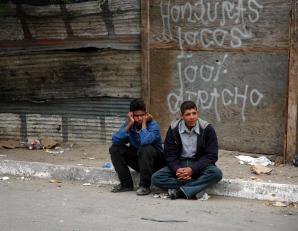 |
 |
 |
 Editorials | May 2007 Editorials | May 2007  
Mexico Wary of Immigration Reform in US
 Marion Lloyd - Houston Chronicle Marion Lloyd - Houston Chronicle


| | Central American migrants bide their time in the street outside Casa del Migrante de Nuevo Laredo, Mexico, waiting for family members to send money so they can try crossing over to the U.S. Shelter workers say they have seen a record number of arrivals this year. (Marion Lloyd/Chronicle) |
Mexico City — After years of lobbying Washington for an overhaul of immigration laws, Mexico's government is keeping a wary distance as the U.S. Senate takes up one of the most comprehensive proposals on the topic in years. The reason: Mexico has been burned before.

"It's been more than six years of talking of changing the status quo and nothing's happened, so there's a lot of frustration and skepticism," said Rafael Fernandez de Castro, a U.S.-Mexico expert here.

Former President Vicente Fox, a former Coca-Cola executive, staked much of his presidency on securing an immigration deal with Washington that would bring an estimated 12 million illegal immigrants, many of whom are from Mexico, out of the shadows.

But those efforts flopped when U.S. legislators shifted their focus after the 9/11 attacks toward sealing off the border.

President Felipe Calderon, who succeeded Fox, doesn't want to make the same mistake.

Official response

So far, the only official comments about the Senate proposal have come from the Mexican foreign affairs ministry, and they've been less than gushing.

During a visit to Washington last week, Foreign Secretary Patricia Espinosa called the bill a "good step forward" but emphasized the battle is far from won.

The bipartisan compromise under debate in the Senate would give immigrants — Mexican officials and media call them "migrants" — who entered the United States illegally before Jan. 1 the chance to remain in the country legally.

The proposal would also create a guest-worker program.

However, the terms of the bill are in constant flux.

"Although the initiative provides concrete steps to legalize some 12 million undocumented workers, it also includes harsh and repressive policing measures, which only hurt the migrants and their families," the left-leaning La Jornada newspaper said in an editorial.

Rise in immigrant deaths

Already, stepped-up border security has led to an increase in immigrants' deaths. More than 400 Mexicans drowned or perished from dehydration while trying to cross illegally into the United States last year, according to Mexican figures.

The bill also makes dodging border checkpoints a prison offense for citizens of countries other than Mexico and Canada.

"For those already inside the country, it's a great opportunity," said Edwin Galvez, 24, a Honduran who was preparing to swim across the Rio Grande into Texas. "But for the rest of us, it's not much help," he said from a shelter in Nuevo Laredo.

He said the bill's proposed guest-worker program is beyond the reach of most immigrants. Under a smaller program currently in operation, he said, workers are required to pay $100 just to apply for the visa. That's an average month's salary in Honduras.

As a result, people working with immigrants say they expect thousands of Central Americans to continue to make the hazardous journey north. Each year, hundreds are killed or maimed after falling from speeding trains in Mexico or from attacks by armed gangs that lurk along the way.

Skill emphasis raises hope

Others in Mexico were encouraged by the bill's new emphasis on rewarding educated workers with skills in demand in the U.S. economy.

"It's a very exciting proposal," said Sonia Roman, 23, a fourth-year business student in Mexico City. She said her college's requirement that graduates speak fluent English would also help her chances of landing work in the United States.

"It would be a dream," she said, noting that starting salaries for business graduates in the capital average a paltry $800 a month.

Others here said the proposal in the Senate would allow millions of Mexicans to reunite with their families back home.

"It would free them to go out on the streets like any normal human being," said Ana Lilia Leija, a homemaker who was waiting for a tourist visa at the U.S. Embassy in Mexico City.

She said her husband's three siblings, who work illegally in New York, hadn't come home in 18 years for fear they wouldn't be able to return.

"I hope something changes," she said, "because living in fear is no way to live."

marionlloyd@gmail.com | 
 | |
 |



